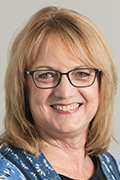Blog
Why health IT matters: Not on the front lines of COVID-19, but not on the sidelines either
Three years ago, I had the privilege of working in communications for a children’s specialty hospital in Minnesota. For nearly 12 years I worked alongside dedicated nurses, physicians, therapists, assistant technology specialists, and a wealth of other healthcare professionals to help advance care for kids who have disabilities and complex health issues.
It was while working with these smart, talented, dedicated people that I encountered my first pandemic. I was part of the hospital’s incident command team in 2009 when another novel virus, H1N1, emerged. Every day, we gathered to plan how we would protect and care for patients, their families, and our healthcare workers. As I crafted messages to our families and helped keep staff informed and prepared, I felt a strong sense of pride that I was truly doing something that mattered.
This March, I watched from my home office as my former co-workers jumped into action to address the COVID-19 pandemic. And I confess that for a brief moment I regretted that I wasn’t there alongside them, that I wasn’t contributing to something important. That feeling was fleeting.
Every day I’m reminded that what we do in health IT matters; that although we’re not on the front lines, we’re not on the sidelines either. Across the country, in more than 2,200 hospitals, providers are using Spok solutions to connect with one another as they battle this insidious disease. Through our paging systems, contact center software, and secure messaging applications they’re staying connected as they scramble to secure personal protective equipment, battle for testing, monitor test results, and connect with patients during what for many is the most challenging time of their lives.
I’m reminded of why I came to Spok in the first place. I came to Spok because I believe that helping care teams connect with people and information plays a vital role in advancing healthcare. I’m reminded of that today more than ever before, and more than ever before I’m proud to be a part of the community driving innovation to help solve these challenges.
“We’re not going to compete on safety.”
During my time working at the hospital, I also witnessed the evolution of The Children’s Hospitals Solutions for Patient Safety coalition. Its mission is “Working together to eliminate serious harm across all children’s hospitals.” Our medical director described it to me this way, “We’re not going to compete on safety.”
Those words resonated with me then and helped me to set aside feelings of competition, my natural inclination as a marketer. I’ve been thinking about those words these days as well. There are more than 6,000 hospitals in the U.S. As of 3 p.m. on April 22 there were 837,136 confirmed cases of COVID-19 in the country and nearly 47,000 deaths. And those numbers will continue to rise. This is not the time to compete on safety.
Today, when I read about how healthcare IT teams around the country are taking action against COVID-19, I listen for the voice of my medical director from all of those years ago. These are times for action. I applaud the efforts of all of the healthcare IT providers who, like Spok, are working tirelessly to support our front-line healthcare workers during this pandemic. I’m proud to work alongside of this group of smart, talented, dedicated software developers, technicians, clinical experts, and a wealth of other professionals to advance healthcare and improve outcomes.
What we do matters
Three years ago, I couldn’t imagine a career like the one I have today. Today, like everyone else, I can’t really imagine what this career, the healthcare industry, or even my own community will look like three months from now, let alone in three more years.
But I know this. What we’re doing today matters. It matters for the grandmother in New York, whose physician quickly received her test results. It matters for the charge nurse in Louisiana who could efficiently activate her team to respond to an influx of patients. It matters for the resident in California who was handed a pager and immediately connected with his colleagues. And it matters to me. I might not be in a hospital, but I’m still helping to improve outcomes for patients around the world. In my own small way, I’m making care collaboration easier.
And for today, that feels like enough. Actually, it feels like more than enough. It feels like we’re making a difference. We might not be on the front lines, and I don’t profess to fully understand what those who are at the bedside of COVID-19 patients are going through. But we’re not on the sidelines either. We’re doing our best to make a difference. We’re doing something that matters.







